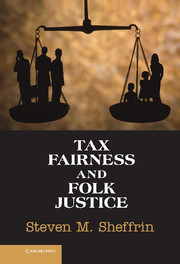Book contents
- Frontmatter
- Dedication
- Contents
- Preface
- Glossary of Terms in Psychology, Philosophy, and Economics
- 1 Approaching Tax Fairness
- 2 The Foundations of Folk Justice
- 3 Fairness and the Property Tax
- 4 Should We Redistribute Income through Taxation?
- 5 Why Do People Pay Taxes?
- 6 Desert, Equity Theory, and Taxation
- 7 Concluding Perspectives
- Bibliography
- Index
5 - Why Do People Pay Taxes?
Published online by Cambridge University Press: 05 July 2013
- Frontmatter
- Dedication
- Contents
- Preface
- Glossary of Terms in Psychology, Philosophy, and Economics
- 1 Approaching Tax Fairness
- 2 The Foundations of Folk Justice
- 3 Fairness and the Property Tax
- 4 Should We Redistribute Income through Taxation?
- 5 Why Do People Pay Taxes?
- 6 Desert, Equity Theory, and Taxation
- 7 Concluding Perspectives
- Bibliography
- Index
Summary
Unlike the property tax and income redistribution, ideas from folk justice have already had a profound effect on expert attitudes toward tax compliance. As we discussed in Chapter 1, the conventional economic view on compliance is based on deterrence. In the classic work of Michael Allingham and Agnar Sandmo, “Income Tax Evasion: A Theoretical Analysis,” the decision to evade taxes is essentially a wager in which a taxpayer decides whether and how much income not to report to the authorities balancing the costs and benefits from taking this risk. Their work has laid the foundation and framework for a large literature that has tried to implement the deterrence model based on economic theory.
Not all economists have agreed with this conventional wisdom. Some economists have disputed the notion that low compliance rates (that is, high rates of evasion) can be fully explained by the rational utility maximization model. These scholars hold that moral values and the attitude of the surrounding community deeply affect the individual’s decision to comply or evade. For example, Sheffrin and Triest (1992) found in an econometric analysis that omitting attitudes toward taxation will lead to underestimating the effects of deterrence of compliance. Frey (1997) has stressed the empirical importance of taxpayers viewing compliance as a “civic duty” whereas Slemrod (2007) argued that tax compliance is positively correlated with professed trust in the government. Tax evasion appears to be not only affected by tax rates, penalties, and auditing rates, but also by the perceptions of and attitudes toward evasion.
- Type
- Chapter
- Information
- Tax Fairness and Folk Justice , pp. 161 - 190Publisher: Cambridge University PressPrint publication year: 2013



